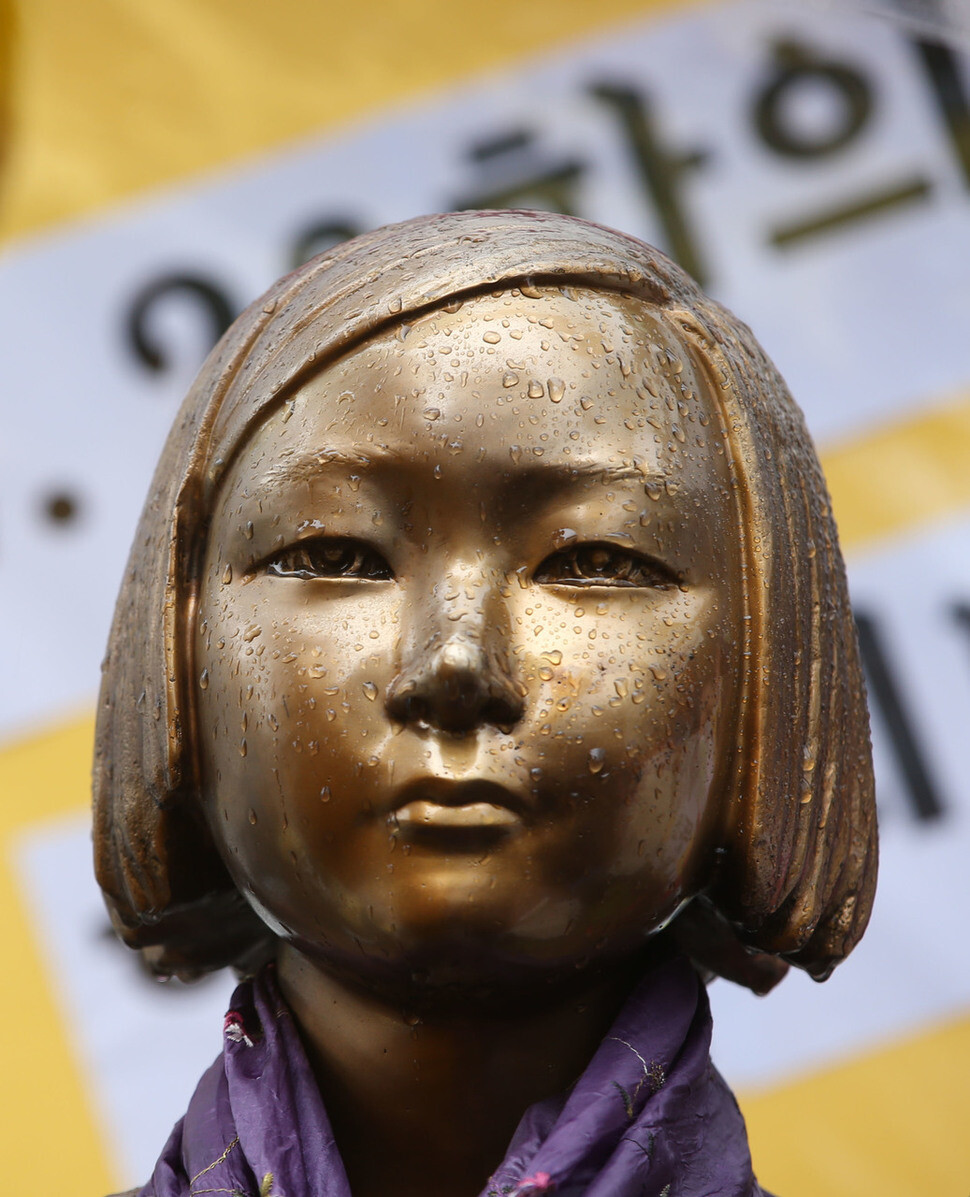hankyoreh
Links to other country sites 다른 나라 사이트 링크
Despite Dec. 28, agreement comfort women to remain international issue

On Oct. 3, Oh Joon, South Korean ambassador to the UN, said that while the agreement about the comfort women reached by Seoul and Tokyo on Dec. 28, 2015, and meant that the comfort women were no longer a bilateral issue for the two countries, this did not bring closure to the comfort women issue on the international stage.
During a parliamentary audit by the Foreign Affairs and Unification Committee of South Korea’s National Assembly that was held at South Korea’s delegation to the UN in New York on Oct. 3, Oh made these remarks after Minjoo Party lawmaker Seol Hoon, criticized last year’s agreement and slammed the negotiations for having ignored the position of the victims.
“The comfort women issue has ceased to be a pending diplomatic issue between South Korea and Japan. But the comfort women and sexual violence against women in wartime did not stop being international and multilateral issues with the Dec. 28 agreement,” Oh said.
But Oh’s diplomatic language does not appear to mean that the South Korean government means to make an issue of the comfort women on the stage of international or multilateral diplomacy. If South Korea did so, Japan would be very likely to accuse it of violating the agreement.
In that agreement, South Korea and Japan agreed to refrain from criticism or recriminations about the comfort women issue on the international stage, including the UN. When South Korean Foreign Minister Yun Byung-se delivered a speech at a high-level meeting of the UN Human Rights Council that was held in Geneva, Switzerland, on Mar. 2, he made no mention of the comfort women issue.
“The issue of the comfort women for the Japanese army [can be viewed in several ways]: first, as a pending bilateral diplomatic issue between South Korea and Japan; second, as a global issue of universal human rights; third, as a historical lesson that we must remember; and fourth, as a complicated problem involving the restoration of the dignity and reputations of the individual victims. Among these various aspects, the one that was resolved through the Dec. 28 agreement was the matter of the comfort women as a pending bilateral diplomatic issue between South Korea and Japan, and it is in this context that Oh Joon’s remarks should be understood,” said Cho June-hyuk, spokesperson for South Korea’s Foreign Ministry, during a press briefing on Oct. 4.
“This means that, provided that the agreement is faithfully implemented, the South Korean and Japanese governments will not make a diplomatic issue of the comfort women. Efforts will continue in other regards, including participating in discussions in the international community in order to protect women’s rights and human rights, since these are universal values, and to address sexual violence against women in wartime,” Cho said.
By Yi Yong-in, Washington correspondent and Lee Je-hun, staff reporter
Please direct questions or comments to [english@hani.co.kr]

Editorial・opinion
![[Guest essay] Preventing Korean Peninsula from becoming front line of new cold war [Guest essay] Preventing Korean Peninsula from becoming front line of new cold war](https://flexible.img.hani.co.kr/flexible/normal/500/300/imgdb/original/2024/0507/7217150679227807.jpg) [Guest essay] Preventing Korean Peninsula from becoming front line of new cold war
[Guest essay] Preventing Korean Peninsula from becoming front line of new cold war![[Column] The state is back — but is it in business? [Column] The state is back — but is it in business?](https://flexible.img.hani.co.kr/flexible/normal/500/300/imgdb/original/2024/0506/8217149564092725.jpg) [Column] The state is back — but is it in business?
[Column] The state is back — but is it in business?- [Column] Life on our Trisolaris
- [Editorial] Penalties for airing allegations against Korea’s first lady endanger free press
- [Editorial] Yoon must halt procurement of SM-3 interceptor missiles
- [Guest essay] Maybe Korea’s rapid population decline is an opportunity, not a crisis
- [Column] Can Yoon steer diplomacy with Russia, China back on track?
- [Column] Season 2 of special prosecutor probe may be coming to Korea soon
- [Column] Park Geun-hye déjà vu in Yoon Suk-yeol
- [Editorial] New weight of N. Korea’s nuclear threats makes dialogue all the more urgent
Most viewed articles
- 1Behind-the-times gender change regulations leave trans Koreans in the lurch
- 2South Korean ambassador attends Putin’s inauguration as US and others boycott
- 3Yoon’s revival of civil affairs senior secretary criticized as shield against judicial scrutiny
- 4Family that exposed military cover-up of loved one’s death reflect on Marine’s death
- 5Hybe-Ador dispute shines light on pervasive issues behind K-pop’s tidy facade
- 6[Guest essay] Preventing Korean Peninsula from becoming front line of new cold war
- 7Yoon’s broken-compass diplomacy is steering Korea into serving US, Japanese interests
- 8Japan says its directives were aimed at increasing Line’s security, not pushing Naver buyout
- 91 in 10 marriages in Korea last year was with a foreign national
- 10[Editorial] New weight of N. Korea’s nuclear threats makes dialogue all the more urgent